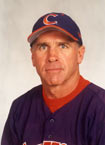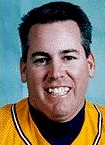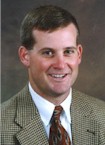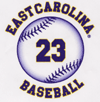|
Cullowhee Family Tree
Arguably the most successful lineage of college baseball coaches can
be traced back to Western Carolina and the tiny town of Cullowhee.
Leggett, LeClair, and Hennon have established winning traditions
wherever they go, and current Western skipper Todd Raleigh, a former
Pirates assistant under LeClair, has the Catamounts back on the rise.
Jack Leggett:
In his
ninth season as head coach at Clemson, 23rd overall. Leggett began
his head coaching career at Vermont ('78-'82), before heading to Western
Carolina ('83-'91).

Career
record: 804-456
Regional Appearances:
14
CWS
Appearances: 3 ('95, '96, '00)
Honors:
ACC Coach-of-the-Year ('94, '95)
ABCA Atlantic Region Coach-of-the-Year ('87)
Southern Conference Coach-of-the-Year ('87)
Notable:
Touted for enforcing
strong academics, Leggett graduated 100% of his players while at
Western. Better than 50% of his players compiled a GPA of 3.0 or
better. Leggett was inducted into the WCU Hall of Fame in the Fall
of 2001.
Keith LeClair: In his fifth season as head coach at East Carolina, 11th overall.
Began head coaching career at alma mater -- WCU ('92-'97).

Career
record: 439-229-2
Regional Appearances:
8
Honors:
Southern Conference
Coach-of-the-Year ( '92, '94, '97)
CAA Coach-of-the-Year ('99, '01 )
ABCA East Region Coach-of-the-Year ('99, '01)
Notable: Will
be inducted into the Western Carolina Hall-of-Fame this October.
Rodney Hennon: In his third season as head coach at Georgia Southern. Hennon
spent two seasons as the head coach at Western Carolina prior to moving
to Statesboro.

Career
record: 199-104-1
Regional Appearances:
3
Honors:
Southern Conference
Coach-of-the-Year (2000, '01).
Notable:
Fastest coach to
reach 100-win plateau in Southern Conference history.
Todd Raleigh: In his third season as head coach at his alma mater -- Western Carolina.

Career
record: 78-87
Regional Appearances:
0
Honors:
Runner-up for Southern Conference
Coach-of-the-Year honors in 2001.
Notable:
Directed the biggest single-season turnaround in Southern Conference
history in 2001 (14.5 games).
|
LeClair Jersey on Sale
at Student Stores and UBE
From ECU Media Relations
GREENVILLE, N.C. -- East
Carolina University's Dowdy Student Stores and University Book Exchange
(UBE) have
 created
a special ECU baseball batting practice "jersey" to honor ECU head coach
Keith LeClair. created
a special ECU baseball batting practice "jersey" to honor ECU head coach
Keith LeClair.
The T-shirt, available
in both purple and white, is emblazoned with a small ECU baseball logo
on the front chest and features LeClair`s name and No. 23 on the back.
Dowdy Student Stores and UBE began selling the shirts today (Thursday,
May 30) at a price of $15.
Proceeds from the shirts will go to the Keith LeClair Family Fund set up
by ECU`s Pirate Club to help offset the family`s medical expenses.
For more information, call Dowdy Student Stores at 328-6731 or UBE at
758-2616.
|
|
East Carolina's next step along its quest for
Omaha promises to be one of mixed emotion. The four-team Clemson regional,
which starts today at 2 PM when the Pirates battle in-state foe Elon,
reunites three members of the Western Carolina family.
Head coaches Jack Leggett (Clemson), Keith
LeClair (East Carolina), and Rodney Hennon (Georgia Southern), all wore the
same Western Carolina uniform during the 1990 and '91 seasons. During
that time, Leggett was the head coach, while LeClair was the top assistant
and Hennon a standout second baseman for the Catamounts.
When Leggett left Cullowhee for Clemson to
become an assistant under legendary Tigers coach Bill Wilhelm, he passed the reigns over to LeClair. Hennon played two
years under LeClair, then returned as an assistant before taking over at
Western when his former boss accepted the vacant post at ECU.
The three remain close friends, and along
with current Western Carolina coach Todd Raleigh, form one of the most
successful coaching family trees in college baseball.
Q & A with Clemson
Coach Jack Leggett
Here
is the transcript from Leggett's Bonesville.net exclusive interview, which
took place in Chapel Hill, where the Tigers took two out of three from the
Heels.
Q: Coach LeClair wasn't the most highly
touted player coming out of high school. What really attracted you to him?
A: Well, I had heard good things about him
as a hitter. There was a kid that played here at North Carolina from up in
Walpole, New Hampshire. They kept comparing the two, so I thought I'd take
a chance on him (LeClair), have him come down and take a good look at the
school. He came down, got off the plane, liked the school, and wanted to
come. We couldn't offer him a scholarship, but we told him he had the
opportunity to be a part of our baseball team.
I respect him so much just for believing in
us. He came in and worked extremely hard. He was just one
of those self-made players. He worked hard on his bunting game, worked
hard in the weight room. By the time he was a junior and senior, he
went from being a singles hitter to hitting the ball off the wall. He
went from being a straight singles hitter to hitting about 18, or 19 home
runs his senior year. He just had a total game for us -- a steady,
competitive, tough baseball player.
Q: Do you think it was his passion that
set him apart from the rest as a player?
A: No question. And that's what sets him
apart now. His passion for being a competitor, his passion for never giving
up, his passion for persistence. He's one of those kids that never gave up
during his time at Western. Nothing was ever guaranteed to him as a
baseball player. I just had the utmost respect for him as a player.
And then, we wanted to keep him around as
an assistant coach. He did a great job with recruiting -- he recruited some
excellent players. He worked extremely hard as a coach, and was very loyal
and dedicated. He became an outstanding coach and I knew when I left
Western Carolina to go to Clemson, it was very important to me that the
program be left in good hands.
That was a very tough decision for me to
leave Western Carolina because I liked it there, and I had always been a
head coach. To go to Clemson as an assistant coach was a very, very tough
decision. The thing that made it worthwhile in my eyes was the fact that I
knew the program was going to be left in great hands with Keith. We had put
a lot of time into that program -- I had been there for nine years. It was
very important to me that the program not go downhill. Coach LeClair did a
great job.
Q: Not all players turn out to be
great coaches. What is it about him that made you
think he'd be a good coach?
A: His passion for the game -- he loves
the game. He's a student of the game. As a player he was, and as a coach
he is. He's just a great competitor. He doesn't accept losing. Losing
bothers him. He's always been willing to work hard enough so that he won't
lose.
He loves the game. He loves being around
18-22 year-old kids. His priorities are in order, and they always have
been.
Q: Coach LeClair admits that he's never
been a hoot-and-holler, in-your-face type of coach. What is it about his
style that makes him so successful.
A: Everybody does it a different way.
He's got some intensity about him, too, now. He'll get on you when he needs
to get on you, but at the same time, he knows when to take you to the side
and take a different approach. One of the things that I
think makes him an effective coach is that he will challenge you. But at
the same time, he will love on you, too.
Q: What about coach LeClair the person?
What have you learned from him over the past year?
A: He's got a great outlook, and he's got
a lot of faith. He's got a lot of hope. He's one of those guys that
believes there's a miracle around the corner. He knows that his friends are
all in this thing with him. We all are feeling the same kind of pain, and
same kind of impact. He's such a good person. He's like a brother to me.
He's like one of my family.
Q: What is it like for you personally when
you go head-to-head with coach LeClair?
A: I've always enjoyed playing Keith's
teams, because I knew we are going to be in for a battle, and I knew we were
going to have to play well to win. I know the other team is going to be
very well coached, and there's going to be great competition. I thrive on
that competition.
You always feel bad when you win, and you
always feel bad when you lose. But at the same time, when that does happen,
you always feel glad to see the person on the other side doing such a good
job. I've always been proud of the teams I've seen him coach. I've been
proud of the competition that we've had against each other. When we do
happen to lose to them, which happens, I feel proud of what he's all about.
It's kind of a Catch-22, you know. If I'm going to lose to somebody, I just
assume it be to him. He's done a great job, and I always enjoy the
competition when we play them.
|
Clemson Regional Week
 |
|
|
|
|
|
Q & A with Ga. Southern
Coach Rodney Hennon
Here is the transcript
from Hennon's Bonesville.net exclusive interview, which took place earlier
this year.
Q:
What was it like to play for coach LeClair?
A: Well, he was a great guy to play for.
I played two years for coach Leggett, and then two years for coach LeClair.
He (LeClair) was following some pretty big footsteps when he took over the program. I
think the thing that he did best was that he was himself. He didn't try to
be coach Leggett. Our team responded well to him.
I think personally where he helped me more
than anything is that he believed in me. That made me a better player. He
had confidence in me and the other guys on the team. That first year he
took over, we won, I think 44 games, and we were one win away from going to
Omaha. The way that he handled that team and the confidence he had in us
really made us a good ballclub.
Q: What was it like coaching under him?
A: I really owe a lot to him. Because
like I said, he showed a lot of confidence in me as a player, and he showed
pretty much that same amount of confidence as a coach. He gave me a lot of
responsibility, and I was able to get a good opportunity as a good coach
working for him. To learn from someone like him, and to be given that kind
of responsibility at a very young age, no question, gave me some great
experience early. That helped me become a better coach.
Q: Do you think you have a similar
coaching style as coach LeClair?
A: We believe in a lot of the same things,
as far as what it takes to be successful, especially at this level. But at
the same time, everybody has to be his own self. The biggest thing I
learned from him is hard work. You've got to work for what you get in this
profession.
Playing together as a team and working
together as a team will take you a long way. We both probably took that
from coach Leggett.
Q: Coach Leggett, coach LeClair, and
yourself all have a wealth of postseason experience as head coaches. What
is it about this lineage of coaches that makes it so successful?
A: I think it kind of gets back to the
things that we all believe in. One thing we took from that program up at
Western Carolina is that it was a family. It was really a family type of
atmosphere. We always were a close knit group as a team. It's not always
like that everywhere.
I know that's something that coach LeClair
has taken with him to East Carolina. Coach Leggett moved to a much bigger
school down at Clemson, but I think it's still that family type of
atmosphere. That's one thing that we've always tried to do down here since
I've been down at Georgia Southern. Some of the best friends that I have to
this day were my teammates there at Western. Coach LeClair is a great
friend.
Q: What about as a person? Are there
certain things that you've learned from coach LeClair in that regard?
A: He's got tremendous faith. His outlook
on life, to me, is just incredible. It's inspiring to all of us. He's got
a positive outlook each and every day. That's something that all of us can
learn from and carry with us.
|